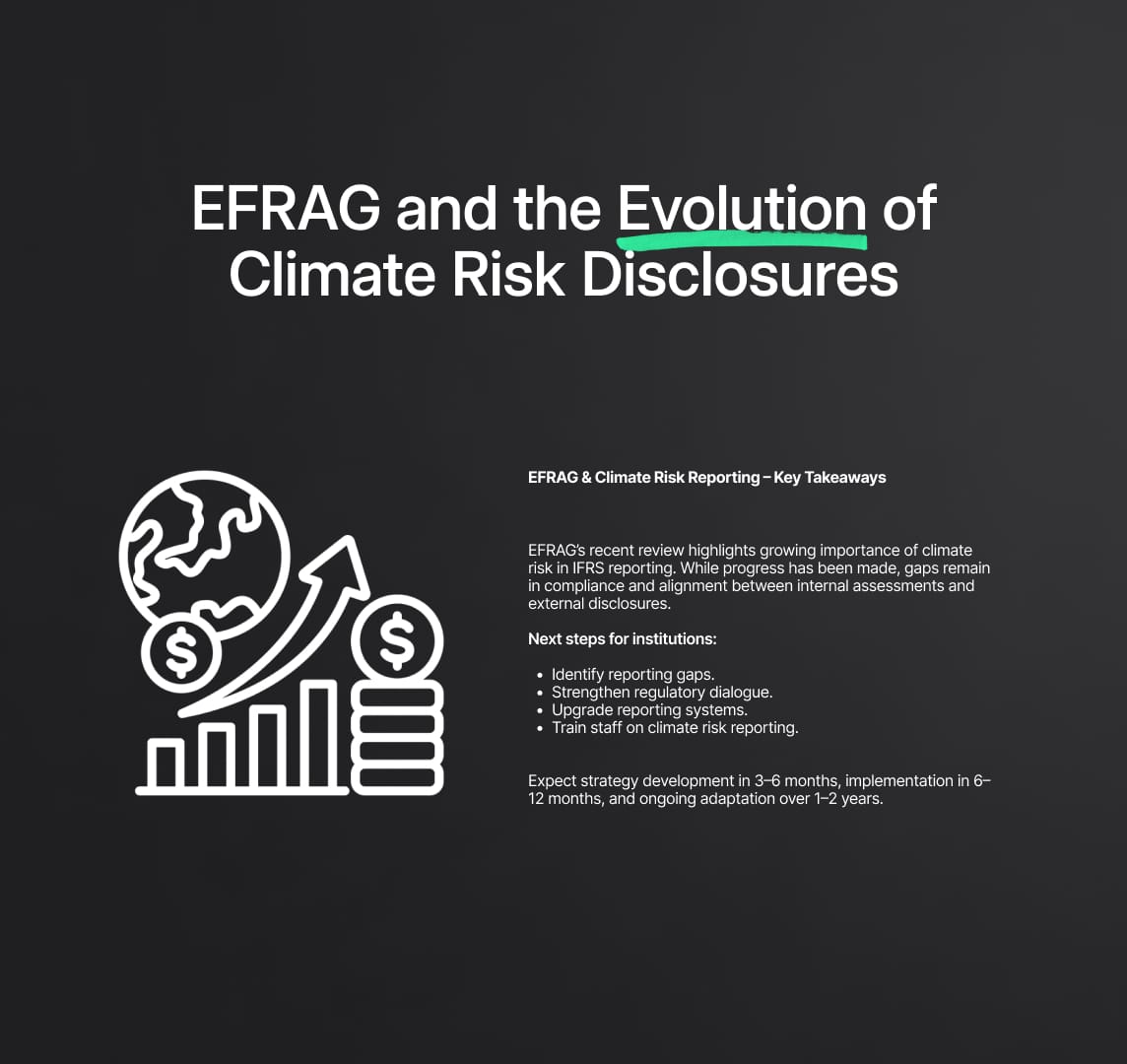EFRAG Climate-Related Risk in Financial Statement: Compliance Role
EFRAG's deep dive into climate risk reporting signifies a paradigm shift in financial transparency. Addressing institutions under the IFRS framework, it reveals concerns in current practices, urging an overhaul of regulatory approaches.

EFRAG Summary on Climate-Related Risks in Financial Statements, Highlighting Importance of Compliance
The European Financial Reporting Advisory Group (EFRAG) has recently unveiled its Briefing Summary on the International Accounting Standards Board's (IASB) project on Climate-Related Risks in Financial Statements (CRFS). This Summary outlines key findings derived from EFRAG's outreach and investigative reviews into European companies' reporting practices. These findings, based on surveys and stakeholder meetings conducted between June and July 2023, are essential for the IASB project on CRFS and EFRAG's research project on the connectivity between financial and sustainability reporting information. The report reveals an improving trend in climate risk reporting, but also identifies areas of concern, including instances of non-compliance with IFRS Accounting Standards and limitations in existing IFRS requirements. Stakeholders have proposed several IASB actions, including the issuance of application guidance, enhancement of educational material, and amendments to current accounting standards.

Evolving Climate Risk Reporting: EFRAG’s Comprehensive Analysis and its Impact on Financial Reporting's Future
In the era of accelerated global change, financial reporting is witnessing a paradigm shift. Climate risks, which were once a peripheral concern, are now at the epicenter of discussions. The European Financial Reporting Advisory Group (EFRAG) has recently delved deep into this area, offering insights that stand to revolutionize financial transparency and accountability across industries.
At the heart of EFRAG's discourse are entities operating under the IFRS (International Financial Reporting Standards) framework. This encompasses a vast range of institutions from banks, insurance firms, investment funds to even smaller financial entities. While EFRAG’s locus is predominantly the European Union, the implications of its findings are poised to permeate the global financial ecosystem. Any institution aligned with IFRS, irrespective of its geographical locale, will find these insights invaluable.
EFRAG's meticulous investigation spanned European companies' reporting structures and methodologies. While there was a discernible uptick in the quality of climate risk reporting, the study did unearth several areas of concern. Instances of non-compliance with IFRS Accounting Standards and perceived limitations in the existing regulatory framework raised eyebrows. This suggests a pressing need for organizations to tighten the coherence between internal assessments and the external representation of climate-related risks.
For regulatory titans like the IASB, EFRAG’s findings could be the catalyst for a complete overhaul of their approach. From updating their educational material to amending regulatory guidelines, there's an expansive trajectory ahead. Institutions might be staring at a dual challenge: adapting to augmented scrutiny measures and circumventing potential non-compliance repercussions.
To navigate these choppy waters, institutions should consider a multi-pronged strategy:
- Gap Analysis: Initiate a granular examination to identify non-compliance areas and misalignments in current reporting practices.
- Regulatory Collaboration: Forge stronger ties with regulatory bodies. This symbiotic relationship can aid in deciphering and implementing new directives.
- System Overhaul: Infuse agility into reporting infrastructures, ensuring they are malleable enough to adapt to evolving climate risk data requisites.
- Enhanced Training: Beyond mere awareness, cultivate a culture where personnel not only understand but also champion the cause of accurate climate risk reporting.
In the immediate future (3-6 months), the financial arena will likely resonate with discussions, collaborations, and strategy blueprints. As we transition to the medium term (6-12 months), tangible changes in reporting mechanisms should emerge. And as the long term (1-2 years) horizon beckons, financial institutions will need to exhibit adaptability, continually recalibrating their strategies in line with IASB's evolving guidelines.
Beyond the immediate imperatives, EFRAG’s discourse might stimulate a global introspection. The narrative could extend from climate risks to a broader spectrum of environmental, social, and governance (ESG) factors. This holistic approach to risk reporting could pave the way for a future where financial statements offer a transparent window not just into an institution's fiscal health but also its societal impact and stewardship.
EFRAG's deep dive into climate risk reporting is more than a mere report; it’s a clarion call. As financial institutions grapple with these evolving demands, the opportunity arises for a new era of transparency, trust, and accountability. The journey promises challenges, but the destination—a more transparent and accountable financial ecosystem—is undeniably worth the trek.
Reduce your
compliance risks

